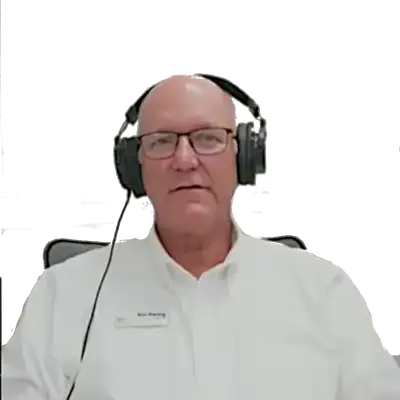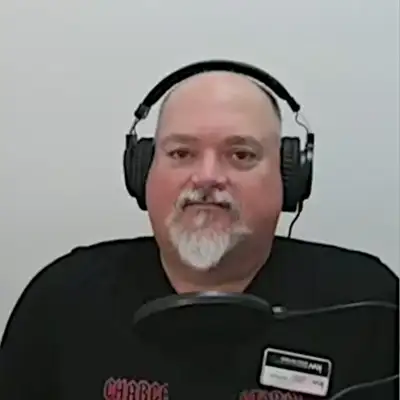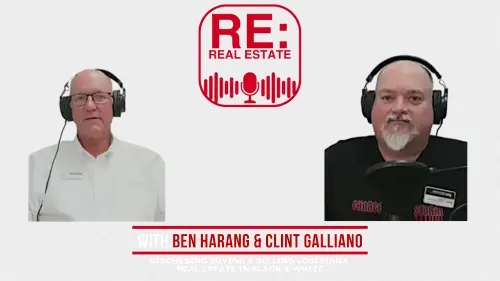Sellers: Listing Appointment
Clint C. Galliano (00:27)
How you doing, Ben?
Ben Harang (00:29)
Man, I'm doing terrific this afternoon. How you doing,
Clint C. Galliano (00:32)
I'm wonderful. We're coming back here after doing this buyer series of episodes and we're going to start out with the seller series.
Ben Harang (00:34)
Good.
It's going to be interesting. Traditionally, that's where agents, that's where most people meet, met, used to meet agents before we had agency changes and all that stuff. But just looking at it through the seller's eyes will be a little different from what we've done the last eight or 10 episodes.
Clint C. Galliano (01:09)
Yep. All right, so why you start us off. What's the first step from a seller's perspective?
Ben Harang (01:13)
Alright.
So the first thing is if you decide you think you might want some help selling your house is to make an appointment with
A real estate agent, a realtor that you feel comfortable with or you think you would feel comfortable with either from a referral or reputation or advertising, however you would come about it. But make an appointment with them. They can go out to your house. Start to build a relationship with somebody. You can call me, you can call Clint, you can call whoever you want to call, but it needs to be somebody that you're comfortable with.
and have trust in that is competent and good at what they do. They bring market knowledge to the table. And what a lot of people don't really understand, some people want to sell their houses themselves to save some money. And I get that. The market knowledge and the representation that you're not getting by selling your house on your own, you
You have one house and you're trying to find one buyer for your one house. We have approximately 400 agents in the Bayou Board of Realtors who most of which have buyers that are actively looking. And when a house hits the market, they get matched up pretty quickly if the house is priced properly. So that's the first thing that the agents bring to the table.
as far as listing the house. Typically, statistics say we get 13 % more for the house than you are able to get on your own. So even with us getting paid, we feel like we put more money in your pocket. But it gets us into your house to look at it, to do an assessment.
to see if it's ready for the market, to see if any repairs need to be made. If the house is ready for the market when it hits it and you put its best foot forward, the reception that you'll get from the buyers will be a lot better than if you say, yeah, well, I'm gonna paint that room or I'm gonna change that carpet or I'm gonna take the carpet out or yeah, I'm gonna fix the roof.
All of those things, whatever you're going to do, should be done prior to actually listing it. And when we're looking at the property, not only are we looking at things that should be done from a marketing standpoint, but from an appraisal standpoint. When we get the house on the market, we get a purchase agreement on it. It's typically subject to an appraisal.
And if we see things that the appraiser will obviously cite, such as peeling paint, a dishwasher that's not working, we try to eliminate those things. If they come find something that we're not aware of, that's one thing. But if we know we need to fix some things on the front end, it's crazy. But a lot of people don't realize if you have a dishwasher that's not working,
that house can't be financed until that dishwasher is working. But if you have a house without a dishwasher, that house can be financed. So the mechanics of the house that are there need to all be working. So.
Clint C. Galliano (05:09)
So a couple of caveats on that. On the RD loans and the FHA loans, if an appliance or a piece of mechanical equipment like dishwashers or air conditioners, if they're in place and don't work, then they will not pass the appraisal for the financing.
Conventional loans, that's a different story. They can be in there and not work and the lender typically won't have an issue. Now the conventional loan appraisal overlays are getting a little tighter. They're being a little bit more strict on what they'll allow, but they tend to be a little looser on conventional appraisals as far as what they'll allow just because the buyer
is by putting more money down so the lender has less risk for the value of the property.
Ben Harang (06:14)
So one of the other things we do is accurately measure the house. measuring a house to me is second nature. I've seen some new agents. We refer to drawing the house. And when we say that, we draw the footprint of the house as it sits on the ground and we measure the exterior dimensions.
Clint C. Galliano (06:13)
Yeah, maybe so.
Ben Harang (06:39)
And I'll see new agents come in and we say, okay, we'll draw the house so we can get the dimensions and look down at their clipboard. And as the front of a stick built house with the roof line and the windows and the door, they are actually drawing the house. That's not what we do. We draw the footprint on the ground to develop the square footage. Square footage of heated and cooled, that's referred to as living area, the garage or carports, the porches, the...
out buildings, the patios, whether they're covered or not covered. We get the second floors, two-story houses. The second floor is a fun to measure. You know, with the right equipment with a laser and a tape measure and a wheel, and there's all kinds of tricks to the trade to get them measured, but we get it measured, and the appraiser looks at those measurements.
when he measures the house, because the appraiser goes in after us to measure it, and if he is close, he moves on. If he sees a large discrepancy, bells go off and one of us did something wrong. So I like to think I measured pretty good. Most appraisers measure pretty good. So we typically don't have that problem unless somebody just literally misread a tape measure.
So we're gathering in. Go ahead.
Clint C. Galliano (08:08)
Have you ever
had an appraiser mismeasure and contact you and then correct themselves?
Ben Harang (08:14)
absolutely.
Well, I had somebody that was selling their house. had a buyer and they mismeasured to the tune of about 500 square feet on a 2200 square foot house. The mismeasurement was so gross that the house wasn't eligible to be built in the subdivision because it would have been too small.
So I went out and measured the house just to make sure. And they called the appraiser back and the appraiser came back and to this day does not know how she came up with the numbers she came up with. Don't know if she measured a different house and plugged it into this one or what, but they got it done. everybody's fallible and the more people you have in the process,
the better. mean, cash deals with no financing and no outside, no third party, anything, anything are the scariest of all. Because if I make a mistake, the closing attorney might catch it. Or if the buyer makes a mistake, somebody's there kind of checking everybody else. Not for any kind of gotcha, but just to make sure everything's in place and in order so there are no surprises after the fact.
like another set of eyes.
Clint C. Galliano (09:50)
Yeah, I had one deal where the appraiser called me up and said, hey, I'm getting about 350, 375 square foot difference than what you've got down here. And she asked for my sketches and so I sent her my sketch and my measurements. She reviewed it, she compared it to hers and then she called me back and said, yeah, I mismeasured.
after double checking what I measured are miscalculated. After double checking what I measured and compared it to your sketch, I've updated and everything's good. So that's another key to reiterate about sketching the footprint of the house. You draw the footprint and you put your measurements in. And so it makes it a lot easier to do that comparison if there is a discrepancy to see
Ben Harang (10:28)
Yeah.
Clint C. Galliano (10:47)
where that discrepancy might be coming from.
Ben Harang (10:49)
Right, and I use a program when I measure it so it closes and calculates the perimeter closes and calculates the actual square footage. So if anybody comes back behind me and says, well, how did you come up with that number? Well, here's where the information comes from. So if I put the right information in, the information should be correct. So I have a good feeling I have some confidence in the numbers I come up with are going to be accurate.
The crazy thing to me is if you have a 2000 square foot house, an acceptable measurement is plus or minus 10%. So that 2000 square foot house can be measured by people anywhere from 1800 to 2200 square feet. And new construction is upwards of $200 a square foot. So $200.
a square foot times.
200 square feet helped me with the math, it's I don't know test body of 4,000, but it is a significant difference You know, so anyway the range is why
Clint C. Galliano (12:04)
Yeah.
Yeah, so that was the other thing that reminds me of that I wanted to touch on. A lot of times we'll get the architect's plans for the home when they build and say, here's the plans for it. Well, doesn't mean, excuse my language, but that doesn't mean crap. Because just because the plans say that it should be built to that doesn't mean that the builder built to those
Ben Harang (12:27)
Mm-hmm.
Clint C. Galliano (12:40)
exact specs. It's like when I got my house built, I'd say, okay, well, how big is the house? They say, oh, it's around 2000 square feet. And it's like, okay, exactly. Well, it varies, but it's going be about 2000 square feet. so for 16, 17 years that I lived in my house, I'd say, it's about 2000 square feet after I became a real estate agent.
Ben Harang (12:43)
Right, they? Good.
Mm-hmm.
Clint C. Galliano (13:07)
I decided to go measure my house and it's like 2,163 square feet.
Ben Harang (13:13)
Mm-hmm. You're fortunate it's more than they told you. So. Right. Right. And I touched on this earlier, but I just want to go back and revisit it one more time. The suggestions that I would give you, Clint would give you, a real estate agent would give you to make your house more marketable, you ought to take that to heart.
Clint C. Galliano (13:17)
Right. It's to my benefit. Yeah, celebrate that.
Ben Harang (13:42)
Because I've seen time and time again and more people than not do not listen. It's just human nature. It's a lot of work. It costs money. It takes time. But if the people that I have seen do what I asked them to do over time, get more money, the house sells faster and they can move on with their life for whatever reason they're selling their house a lot sooner.
As opposed to well, I'm not gonna change that floor because what if they don't like the floor I'll put in well if you have an old dead carpeted house and You you don't change it The buyers are gonna gig the seller for that Grossly overestimating the cost of the replacing the floors where if the seller goes in and puts just a a luxury vinyl plank
down throughout the house, it's going to cost some money. And even if the buyer doesn't care for it, they're not going to gig the seller because they don't like the new floor. The floor is new. If the seller wants to change it, he can change it after the sale. And I tell people floors kill the house faster than anything. Because when people walk, I'm as guilty as anybody else, you walk with your head down, you're looking at the floors. And if you don't like the way the floors look, you get turned off by the house.
Clint C. Galliano (15:09)
Yeah, so majority of buyers there and I'm going to say this because I'm the same way. They're lazy. They might have the idea that, hey, I'll buy this and I'll fix it up. You get in it, you're not going to fix it up. I moved in my house, brand new build and there's a couple of things that needed to be fixed. It took 18 years to fix it before we finally fixed it. know, most buyers, they don't want to fix stuff up.
Ben Harang (15:22)
Mm-hmm.
Mm-hmm. Yeah. Yeah.
Clint C. Galliano (15:39)
So ideally, when you go to list your house, you want it to be in the best condition it can be, because that's going to guarantee the quickest sale at the best price. caveat to that is that you don't want to over-improve for the local market. So if you're in a street full of shotgun houses, you don't want to
Ben Harang (15:40)
Yeah, yeah.
Clint C. Galliano (16:09)
two-story New Englander house in the middle of that street because you're never going to get that kind of money. But at the same time, you want to put the best upgrades and at least repair to market condition your house to put it on the market so that people don't walk in and see a worn floor or that the walls need paint or that the light bulbs are out or that the shades are broken. Those types of things.
Ben Harang (16:15)
Mm-hmm.
Mm-hmm.
Yeah, so the the crazy part is and before I started doing this, I didn't understand it The buyers see more houses than anybody else if they're actively in the market They'll they'll see Five or ten or fifteen to twenty or fifty houses. However long they want to look And when they walk into a house whether they understand it or not They're bracketing where that house falls relative to the market
So I tell people the market talks to us, we just need to listen to it. And we have trouble with that sometimes, but the buyers, I've had buyers walk into a house and say, no, this isn't going to work and walk out immediately. And I've had what buyers walk into houses and say, I'm not leaving until this house is under contract.
because they've seen everything else. How is that overpriced? They need work, they need repair. And they walk into something where somebody listened to an agent, made the repairs, got it ready to market. And once it hit the market, it was game over for everybody else. That house was gonna sell next.
Clint C. Galliano (17:50)
It's an amazing thing.
Ben Harang (17:52)
It's amazing how it works, but it does. It does. And it takes time, effort, and money and work. So a lot of people are not willing or able to do it. But if you can do it, it absolutely makes a difference.
Clint C. Galliano (18:10)
So a couple other things that I want to touch on that's critical for the listing appointment is for the sellers to review the property disclosure. That's a big thing. that's a legal document there. It is for the seller to disclose any known
discrepancies, deficiencies with the property. And it covers the land, the structure, the roof, the plumbing, the electrical, flooding, that type of stuff. If pets have lived there, if they're, you know, all the way to if the house has ever been used as a meth lab, you know, and it's like everybody gets to that question. They get to that question and go, what? And it's like, yeah, it's something you need to disclose.
Ben Harang (18:57)
I knew where you were going with that.
Well, hey
Clint C. Galliano (19:05)
The big thing
is that you fill it out to the best of your knowledge. Because if there's something that you know about as a seller and you don't disclose it, then you could get into legal trouble after the sale. So those are the key things. And it's 11 pages of documents, but it's not all 11 pages that you have to fill out. But those are the things that you have to.
because it gives the buyer a little bit of the history or backstory on the home to make them feel more comfortable purchasing the home.
Ben Harang (19:44)
And that document, I tell people, you know, they'll ask, do I have to disclose this or do I have to disclose that? I said, you have a question about whether or not you have to disclose it? The answer is yes, you have to disclose it. You don't want to get caught after the fact of something, I forgot about that. Well, that's not gonna end well.
Clint C. Galliano (19:56)
Do it.
Ben Harang (20:11)
So what I typically do, I bring that document with me and I leave it with the seller and say, this is the homework. Fill it out as best you can. Note whatever questions you have. And you and I can talk about what the question means. And we can talk about your thoughts on it. And you can develop the answer based on our conversation.
I don't fill out that form for anybody. I don't put pen to paper on it. That's a seller's document. It's a legal document, like you said. So it's a pain in the neck to fill out, but 20 minutes later it's done. And you're finished and you don't have to revisit it unless something with the condition of the house changes. And also it asks, the flood question is, has the house ever flooded?
while you owned it?
Prior to you owning it, it's two different questions. Typically, you don't have a whole lot of history, but if you bought a house that you knew took water once for Tropical Storm Allison in 2001 or Hurricane Ida or whatever it was, and you decide to buy it, that's okay. But that's something that needs to be disclosed to the new buyer that it did not flood when you owned it, but you know about a flood that happened before you bought it.
So it's a document that needs to have some thought put into it.
Clint C. Galliano (21:53)
All right, what else do we cover on listing appointments? I'd say we fairly kind of covered everything we wanted to talk about.
Ben Harang (21:57)
What?
I think so. But the biggest thing that I try to impress on people is work with somebody that you get a comfort level with. It's not an adversarial relationship. Whoever you hire is on your side. And we don't always tell you what you want to hear. We tell you the truth. And if we can kind of set that baseline, I think good things happen.
It's when when people say well my house doesn't need to be painted or the floors don't need to be changed or my house is worth $50,000 in any any house ever sold in a subdivision because it's their house That usually doesn't end well So Take the advice sell the house and move on with your life because there's a reason you want to sell the house You don't want to sell the house
just to get it ready for sale, just to have a sign in the front yard, just to have people intrude on your privacy to see the house. You're going through all of that because you want to sell the house and go in a different direction.
Clint C. Galliano (23:12)
Now, whatever that may be. And don't be afraid to talk to two or three listing agents. know, interview them.
Ben Harang (23:14)
Right. Right.
Make some
interview and talk to him and somebody is going to rise above the rest. And there's good agents, there's some average agents, there's agents on the whole spectrum, but it's up to you to find them. But make sure you have a comfort level with them and you and that agent connect.
Clint C. Galliano (23:40)
Bye.
Yeah, find the agent that works for you.
Ben Harang (23:49)
Right. Right.
So I believe that's it, Clint.
Clint C. Galliano (23:55)
All right. Yes, indeed. All right. That's our first first episode in the listing series or seller series. Looking forward to getting this series knocked out. And we might do some interviews in the future with market professionals. So. Subscribe to our podcast.
We're out on all the apps on all the different podcast sites. Can go to our YouTube channel if you want to look at our faces made for radio and, you know, subscribe to that. also have a playlist of some shorts. So it's some little clips of pertinent, segments of the podcast and we're slowly going through them and putting them out there. So.
Like, subscribe, share with your friends if you got some interest.
Ben Harang (24:52)
Okay, we're gonna try something different next week. think Clint and I were talking before we got online that Clint and I are obviously in two different locations. We're about 12 miles apart, but Clint's gonna be on a little road trip when we record our next one and we're gonna do it maybe remotely using his phone and my equipment that I'm using now and see if we can make the magic happen, which is a maith.
Clint C. Galliano (25:19)
Yeah, I don't know if we're going to do
an episode, but we're going to do some testing.
Ben Harang (25:22)
We'll do something for people, maybe just to get a kick out of it, even if it's outtakes.
Clint C. Galliano (25:30)
Yeah, and see the spectacle of convention in Vegas.
Ben Harang (25:31)
But the-
Yeah, well, I wasn't going to say where you go on. You can say that. So the technology is amazing that we can do this relatively simple when you plug things into the right ports and jacks and stuff. I'm not going tell you we had a problem with my equipment before we went on, that something wasn't plugged in right. to be able to record this,
Clint C. Galliano (25:39)
Yes.
Ben Harang (26:04)
in two different locations, put it out on all the different platforms and actually have it out there still amazes me in my simple mind. So I hope you enjoy it. Hope you get something out of it. If you have any questions, comments, leave them in the comments and we'll try to get to them in the next podcast.
Clint C. Galliano (26:25)
All right, Ben, Clint Galliano signing off.
Ben Harang (26:29)
All right Clint, have a good one.
Clint C. Galliano (26:30)
All right. Bye bye.
Creators and Guests



